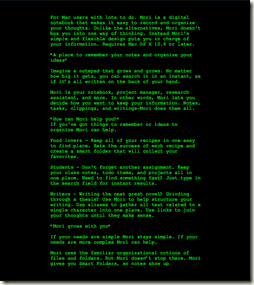 As I’d decided this site was long over-due for a post on the actual nuts and bolts process of writing, I was grateful to find a post on Fuel Your Writing on Making Writing Easy: Practical Tools. It’s basically a list of tools to support your writing by helping you manage the process more effectively.
As I’d decided this site was long over-due for a post on the actual nuts and bolts process of writing, I was grateful to find a post on Fuel Your Writing on Making Writing Easy: Practical Tools. It’s basically a list of tools to support your writing by helping you manage the process more effectively.
The interesting thing about doing a PhD, but which seldom gets discussed, is the natural way you tend to evolve your own techniques for writing and researching. I still like to hand-write notes when I do an initial trawl through a book, so when I started my PhD, I printed out a batch of note cover-pages. The cover-page allowed me to quickly and clearly record a complete reference for the book and summarise both its content and what areas were of particular relevance to my own research. It was a bit clunky (I didn’t get all the boxes the right size and never got round to changing it) but at times it was such a life saver when I knew I’d read something, somewhere, at some point that was sort of related…
But like I say, for some reason we academics don’t seem to share these things with each other?! Perhaps we can’t find the time…
Anyway, that’s why I like posts like Making Writing Easy, by Christopher Jackson.
He starts by describing the benefits of having a pad and pen – scratchpad – next to you as you work to catch lots of ideas for ‘processing’ later. This is a system I couldn’t live without – particularly when writing my thesis! Now, no matter what I’m working on, I have some paper available so that I can get things out of my head for later and focus on the job in hand. For these purposes, I use unlined paper because I can make notes that are more free-flowing and then I organise the information later. And it helps me notice the connections between things (maybe like my food shopping list and an idea for a blog post on food that keeps you alert when writing for long periods of time) if I’m a bit less regimented when first capturing my thoughts on paper.
Another tool Jackson mentions – which I’ve also trialled – is Dark Room (WriteRoom for Mac users), a free and really pared-down software designed to minimise distractions. He explains:
“These two downloads take away toolbars, menus and other such clutter so you can focus on what is important – the writing. Just being able to see the text can be a real help for clearing your mind, concentrating on writing and freeing your imagination. Because these programs fill the screen they can also filter out other distractions such as email, Twitter, FB etc.”
I didn’t discover Dark Room until after I’d finished my PhD and I think it would be a bit long-winded when working on something as massive as a thesis, but it’s worth testing it out if you get distracted easily. At first I loved it and thought it was the most amazing invention in the universe ever (after Nutella that is)! But then I stopped using it. I’m not entirely sure why I gave up on it, but on balance I think that if you are having a phase of feeling particularly unproductive, it can definitely help get you kick-started. And for me, there’s always something about writing in light colours on a dark back-ground that’s easier on the eye…but that’s just a personal preference.
And finally, I like the idea that Jackson connects the writing process with other forms of creativity. I think in academia we forget this. Half-way through my PhD I had a phase of getting really stuck. One day I went off to a craft shop and bought a load of mosaic-making stuff and spent a wonderfully relaxing afternoon working on a vase. I initially felt guilty about the time I was apparently wasting on something that had nothing to do with my PhD, but the next day I managed the equivalent of three-full days of very good work in just one day!
Posts like Jackson’s are really useful, I just wish there were more like his but by academics, and specific to that area of writing. So if you’ve got some systems you couldn’t write without – do let me know!







Christopher Jackson said on July 7, 2010
Thank you for going through my article like this and sharing it with your readers! I really appreciate it!
Glad you enjoyed my article 🙂
Christopher Jackson said on July 8, 2010
Thanks for going through my article and sharing it with your readers! I really appreciate it.
Glad that you enjoyed my article and found it useful! 🙂